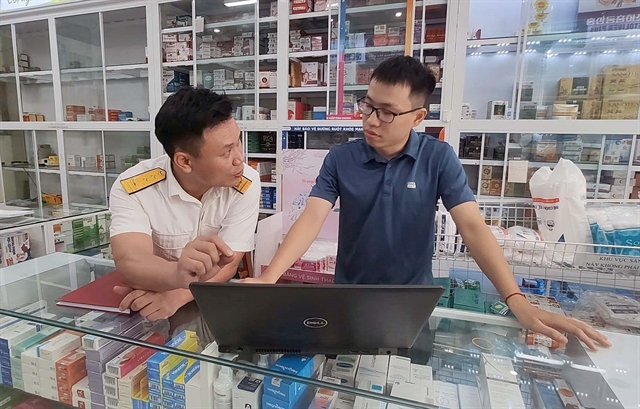 Economy
Economy

 |
| A tax official is instructing a household business about tax declaration. The tax authority has pledged support to household businesses in the transition from long-standing lump-sum tax regime to self-declaration - based system. — VNA/VNS Photo Hoàng Ngọc |
HÀ NỘI — The tax authority has pledged comprehensive support to household businesses as they transition from the long-standing lump-sum tax regime to a self-declaration system, ensuring no business is left behind.
According to the General Department of Taxation, as of the end of October, there are 3.83 million household businesses nationwide. Of these, 44.4 per cent report annual revenue below VNĐ200 million (US$7,800), 23 per cent between VNĐ200 million and VNĐ3 billion, and one per cent above VNĐ3 billion.
Those earning between VNĐ200 million and VNĐ3 billion, an estimated 883,000 households, are the most affected by the transition.
Mai Sơn, Deputy Director of the General Department of Taxation, said at a conference on Wednesday that with the abolition of the lump-sum tax system from the start of 2026, the tax authority will shift to a new management model for household businesses based on revenue thresholds and business development levels.
Under the new system, household businesses will be divided into three groups. Those with annual revenue of up to VNĐ200 million will be exempt from taxes and not required to use e-invoices.
Households with annual revenue between VNĐ200 million and VNĐ3 billion must declare quarterly and apply basic accounting practices. Those earning more than VNĐ1 billion per year will also be required to use e-invoices either authenticated by the tax authority or generated through cash registers.
Households with annual revenue above VNĐ3 billion will follow more complex accounting standards and declare taxes similarly to small enterprises.
“The goal is not to raise the tax burden but to create a fair and transparent business environment between household businesses and enterprises, as well as helping households to improve their governance capacity,” he said.
The reform also encourages household businesses to evolve into enterprises as they expand. Those converting into small or micro-sized enterprises will enjoy a two-year corporate income tax exemption and preferential rates of 15-17 per cent in subsequent years, depending on their scale.
However, for small households with family-based operations, stable but modest revenue, and primarily retail activities, it is advisable to remain under the household business model to avoid unnecessary costs, he added.
To facilitate the transition, the General Department of Taxation has launched a “60-day campaign” to assist household businesses in adopting the new system. Support includes in-person training sessions at traditional markets and online tutorials via Zalo and Facebook. In November, the eTax Mobile app will be updated with an AI chatbot.
The tax authority is also collaborating with technology providers to offer free or discounted accounting and e-invoicing software, along with installation assistance and user training.
“The goal is to ensure that no household business is left behind and create the most favourable conditions for them to grow sustainably and comply with tax regulations confidently and proactively,” Sơn stressed.
Flexible support measures will also be applied for areas affected by natural disasters and vulnerable household groups, while ensuring transparency in inspections.
“Clear and transparent guidance is the best way to minimise risks,” he said, emphasising that compliant businesses will not face unreasonable inspections.
Nguyễn Thị Cúc, President of the Vietnam Tax Consultants Association, said many household businesses are willing to comply but remain concerned about retroactive tax collection, inventory valuation, and the complexity of e-invoice systems. She urged the development of a unified software platform and smoother data integration to facilitate a smoother transition.
Politburo Resolution 68 assigned the Ministry of Finance to provide a standard software solution. However, multiple existing platforms such as Sapo and MISA pose challenges, she said, adding that a unified platform is essential to facilitate the transition. — VNS




